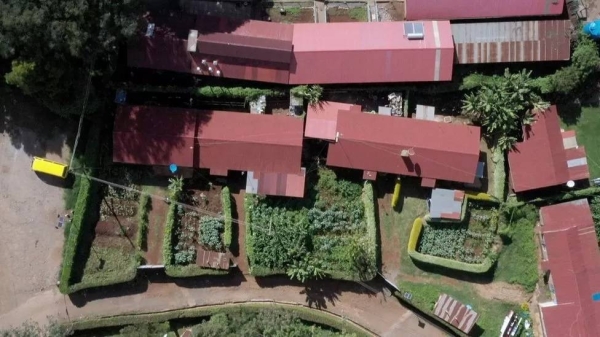
A man who walked in on his 70-year-old wife with dementia being allegedly sexually assaulted by a fellow resident at her Sydney aged care home has blamed under-staffing for failing to properly monitor residents.
The 75-year-old man, José, said he has not been able to sleep properly since the alleged 20 March assault on his wife, Shannon, and that he wants answers about why his wife was able to wander off alone down a corridor and into the man’s room.
He has also spoken of his distress after the alleged assault was described in an incident report as “cuddling”.
Aged care researchers and experts said the alleged incident highlighted flaws that remain in the system of reporting sexual assaults in aged care, despite the comprehensive findings and recommendations for reform from the aged care royal commission.
José said on the day of the alleged incident he saw two staff at the home, both busy serving lunch.
“And on this particular day I came to the home and one of the staff serving lunch saw me, and because she knows me she told me my wife was in her room because she refused to come for lunch,” José said. “So I proceeded to go down to her room and on my way down the corridor, I happened to hear my wife’s voice in a room with the door open.
“I saw my wife on the bed with a man. He was fondling her breasts, and he had his other hand inside her thighs. I just froze for a second and then I just screamed at her, ‘get out of there!’. And my wife came out to me and she said ‘that’s my husband’.”
José said the home knew his wife had dementia and referred to men she did not know as her “son” or “husband”.
José said the man who allegedly sexually assaulted his wife also has dementia and was at the home on respite. The man has since left respite care and is back in the care of his family.
José said he did not want the home in Sydney’s north-west named because he believes they had all the right protocols in place.
“There was CCTV in all corridors, and while rooms do not have CCTV there are sensors in the bedrooms,” he said. “The right protocols were in place, but those protocols failed. And the reason they failed is because they were short-staffed. Two staff during lunch hour is not appropriate when one of those staff is in the lunch area preparing food to be sent out.
“This nursing home is short-staffed, and probably underfunded.”
José said these issues had failed to be addressed since the aged care royal commission handed down its final report on 1 March, which found the legislation that governs aged care has focused on the funding requirements of aged care providers rather than the care needs of older people.
The commission’s recommendations included a minimum quality and safety standard for staff time in residential aged care, including an appropriate skills mix and daily minimum staff time for registered nurses, enrolled nurses and personal care workers for each resident, and at least one registered nurse on site at all times. The home where Shannon resides does have a 24/7 registered nurse onsite.
The Australian Medical Association has said mandated minimum staff ratios for more nurses and better trained staff in aged care were needed urgently to help keep residents safe.
An incident report seen by Guardian Australia states that José’s wife “was found in another resident’s room cuddling on the bed with a male resident at the memory support unit”.
“Both residents presented with no signs of distress,” the report said. They would be closely monitored and kept separate following the incident, the report said. José said he was not provided with a copy of the report until more than one week after the alleged assault.
“Unfortunately I couldn’t bring myself to read it until a couple of days later, as I haven’t been sleeping for days and days after this happened,” he said. “When I read it, you know, I was flabbergasted. Cuddling? No, it was not cuddling. It’s much more. And he was grappling with her breasts, you know, and my wife has had breast cancer surgery on both breasts so I was worried about her being hurt.”
In a statement, a spokesman for the home said that “an incident of inappropriate behaviour between a female resident and male in respite care in the facility’s memory support unit was reported to us on 20 March 2021”.
In response, the spokesman said the residents involved were relocated and “closely monitored each for any physical, emotional and psychological distress in addition to providing their usual care”.
They said they had consulted the Aged Care Quality and Safety Commission and fully complied with their obligations under aged care legislation.
“We place a high focus on the care of our residents and regret any distress caused. We continue to work closely with the family and doctor of the resident to ensure care is paramount and appropriately provided any emotional support required.”
The home did not respond to questions about the discrepancy between the incident report and José’s account, or when the commission was alerted.
“I wanted to keep my wife at home and care for her,” José said. “But she would wake up and look at me like a stranger and be scared of me, so I would sleep in my car. You know, she would try to leave home whenever she could. It wasn’t safe.”
Shannon’s daughter, Jennifer, told Guardian Australia that she questioned how the home had concluded her mother was not distressed by the incident. She claims that in the days following the incident, Shannon had become more agitated, and in one incident, was found naked and spreading her faeces on a wall.
“The man had dementia as well, I get it,” she said. “But it is on the nursing home to record it properly. Shouldn’t people with dementia be monitored more? And don’t people like my mum still have the right to consent? How could she consent?”
In October the aged care royal commission heard 2,520 sexual assaults occurred in residential nursing homes in 2018-19, and estimated 50 sexual assaults a week continued to occur.
“This is a disgrace and should be a source of national shame,” the final report said.
However, there were no explicit references to addressing sexual assault in the royal commission’s recommendations report.
Director of the Older People and Sexual Rights Institute, Dr Catherine Barrett, said until 1 April, there were some circumstances in which aged care providers were not required to report alleged sexual assault to the Aged Care Quality and Safety Commission.
Approved providers did not need to report when the alleged assault is perpetrated by a resident with an assessed cognitive or mental impairment, and care arrangements are put in place to manage the behaviour within 24 hours. It meant those with cognitive impairment alleged to have abused another resident were not being captured in the commission’s data, Barrett said.
The Aged Care Quality and Safety Commission has since April introduced a Serious Incident Response Scheme, which requires every residential aged care service to report a broader range of serious incidents.
This includes reports of all incidents that are alleged or suspected to have occurred, including where the person who commits the incident has a cognitive or mental impairment such as dementia.
Reportable incidents include unlawful sexual contact or inappropriate sexual conduct.
“The perception previously from aged care providers has too often been ‘well, the person who performed the assault or who was assaulted has dementia, they have no perception of what happened’,” Barrett said.
“But we don’t know that is the case at all. Just because a person with dementia may not be able to communicate the impact, it doesn’t mean there hasn’t been an impact. And why should we have to argue that sexual assault has a negative impact on anyone? Why don’t we just stop it?”.
A 2019 report by KPMG conducted on behalf of the federal department of health surveyed more than 170 aged care service providers in Australia, and analysed 31 incidents categorised by staff as rape or sexual assault, including touching of a resident’s genital area without consent.
The staff surveyed said the majority of these incidents (58.1%) resulted in “no impact”.
“Without further information on these particular incidents it is difficult to understand why these incidents were classified in this manner,” the KPMG report found.
Barrett said it meant she was not confident that incidents reported to the Serious Incident Response Scheme would be accurately categorised in terms of severity and impact on the victim.
“We need to educate service providers about what sexual assault is and isn’t. Appropriately categorising an incident is essential to an appropriate response, whether that’s support for family, support for the woman and response to the alleged perpetrator,” she said.
The royal commission heard most sexual abuse and sexual assaults in aged care were perpetrated by men and that most victims were women.
The director of Aged Care Reform Now, public health researcher Dr Sarah Russell, said one month on from the release of the aged care royal commission’s final report, there has been a lack of visible action and political will from politicians to reform aged care.
“Aged Care Reform Now continues to receive complaints of neglect, negligence, poor complaint handling and sexual assault in aged care services,” she said. “Some of the recommendations could be implemented today if the government had the will.”












